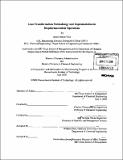Lean transformation methodology and implementation in biopharmaceutical operations
Author(s)
Villa, Adam Daniel
DownloadFull printable version (15.64Mb)
Other Contributors
Leaders for Manufacturing Program.
Advisor
Charles Cooney and Roy Welsch.
Terms of use
Metadata
Show full item recordAbstract
Amgen's Operations division is responsible for the production, release and distribution of commercial and clinical products. Due to industry consolidation, impending competition and revenue impacts, Amgen is facing the need to rapidly improve the Operations division and align different manufacturing sites. In order to achieve these goals, the Operations Improvement group is leading an initiative to bring about a lean transformation of Amgen's operations.This thesis analyzes the initial operational excellence efforts underway within Amgen Operations. The analysis includes an overview of the process by which the continuous improvement methodology and strategy were constructed, the creation of a training curriculum and the initial implementation of the continuous improvement methodology at specific manufacturing sites. In addition, the thesis explores the environment in which this program operates and the cultural and business drivers that support and detract from the efforts.The following conclusions were developed as a result of the analysis of the lean transformation efforts at Amgen. First, company and industry specific nomenclature is essential to make lean principles contextually relevant for the biopharmaceutical industry. Additionally, relevant metrics are needed to facilitate multi-site alignment and drive the desired behavior. Finally, continuous improvement efforts can effectively leverage a science-based culture by applying it to a new business context.
Description
Thesis (M.B.A.)--Massachusetts Institute of Technology, Sloan School of Management; and, (S.M.)--Massachusetts Institute of Technology, Dept. of Chemical Engineering; in conjunction with the Leaders for Manufacturing Program at MIT, 2008. Includes bibliographical references (p. 77-78).
Date issued
2008Department
Leaders for Manufacturing Program at MIT; Massachusetts Institute of Technology. Department of Chemical Engineering; Sloan School of ManagementPublisher
Massachusetts Institute of Technology
Keywords
Sloan School of Management., Chemical Engineering., Leaders for Manufacturing Program.